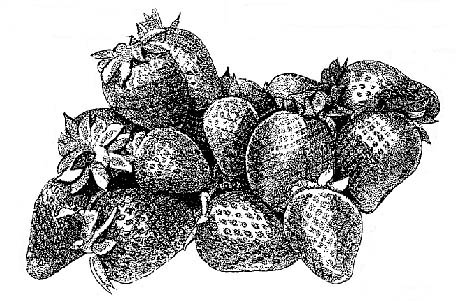

When we think of fruits and vegetables, we're pretty sure about which is which. We tend to lump sweet or sour-tasting plants together as fruits, and those plants that are not sugary we consider vegetables. To be more accurate, however, we must consider which part of the plant we are eating. While vegetables are defined as plants cultivated for their edible parts, the botanical term "fruit" is more specific. It is a mature, thickened ovary or ovaries of a seed-bearing plant, together with accessory parts such as fleshy layers of tissue or "pulp." Thus, many of the foods we think of casually as fruits, such as rhubarb (of which we eat the leaf stalks), are not fruits at all, and many of our favorite "vegetables" actually fit the definition of fruit, such as the tomato.
As a subcategory of fruits, berries are yet another story. A berry is an indehiscent (not splitting apart at maturity) fruit derived from a single ovary and having the whole wall fleshy. Berries are not all tiny, and they're not all sweet. Surprisingly, eggplants, tomatoes and avocados are botanically classified as berries. And the popular strawberry is not a berry at all.
Botanists call the strawberry a "false fruit," a pseudocarp. A strawberry is actually a multiple fruit which consists of many tiny individual fruits embedded in a fleshy receptacle. The brownish or whitish specks, which are commonly considered seeds, are the true fruits, called achenes, and each of them surrounds a tiny seed.
These achenes also make strawberries relatively high in fiber. According to the Wellness Encyclopedia of Food and Nutrition, one-half cup of strawberries supplies more fiber than a slice of whole wheat bread, and more than 70 percent of the recommended daily allowance of vitamin C.
The cultivated strawberry is a hybrid of two different parent species. Because they are hybrids, cultivated strawberries are often able to adapt to extreme weather conditions and environments. While California and Florida are the largest producers, strawberries are grown in all 50 states.
Strawberries are a significant crop in Pennsylvania, but they have a relatively short season. According to Carolyn Beinlich of Triple B Farms, a local pick-your-own berry farm in Monongahela, Pennsylvania's ideal strawberry season lasts three and one-half weeks. The plants form their fruit buds in the fall, so adequate moisture at that time is vital. Since October 1996 was a rainy month, Beinlich is looking forward to a bountiful strawberry crop this season.
The recipe shown here is among Beinlich's favorites for celebrating the strawberry season. For more information about Triple B Farms, call 258-3557.
Lynn Parrucci is program coordinator, and Amy Eubanks is a research assistant, at the Science Center's Kitchen Theater. Botanist Sue Thompson of Carnegie Museum of Natural History, also contributed to this article.
***
Visit the Kitchen Theater at Carnegie Science Center to learn more about the science
of cooking, and get a taste of what we're cooking and a recipe to take home. For a
schedule of daily cooking shows, check the schedule board in the Science Center lobby
on the day of your visit, or call 237-3400. Be sure to ask if there is a guest chef
appearing. The Kitchen Theater at Carnegie Science Center is sponsored by the Jewish
Healthcare Foundation. n
Easy Strawberry Pie
1 quart strawberries, washed and drained well, stems removed
3_4 cup white sugar
11_2 Tablespoons cornstarch
1 1/2 cups water
1 3-ounce package strawberry gelatin
1 9-inch baked pie shell
Boil sugar, cornstarch and water until clear (about 10 minutes). Mix well with strawberries and spoon into pie shell. Refrigerate three hours. Top with whipped cream if desired, and serve.
Carolyn Beinlich of Triple B Farms will present a cooking demonstration on strawberries at the Science Center's Kitchen Theater Sunday, June 1, at 1:30 and 3:30 p.m. Stop by for a taste of pie and jam, and take home some recipes for strawberry delicacies. The presentation is free with an exhibits ticket. For information call 237-3400.